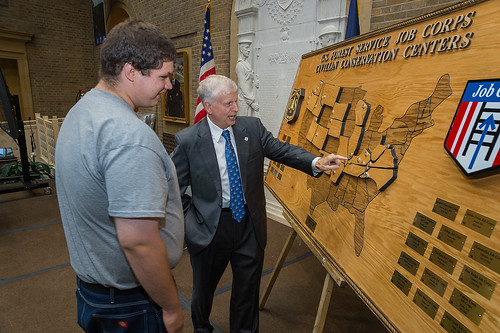
Fifty years ago, President Lyndon Johnson signed into law the Economic Opportunity Act. This Act, part of the government effort to wipe out poverty, created the Job Corps program, which has had a positive effect on countless young lives, giving them a chance to break multi-generational cycles of poverty, get an education, and find jobs in the federal and private sectors, and in the military. The U.S. Forest Service works closely with the Department of Labor to operate Job Corps Civilian Conservation Centers (Job Corps CCCs) around the country.
Last week, dignitaries including Deputy Under Secretary Butch Blazer, Forest Service Chief Tom Tidwell, and Tina Terrell, Forest Service National Director of the Job Corps, along with colleagues from the Department of Labor, came together in Washington at USDA’s Whitten Building to mark the anniversary.
As Chief of Staff for Natural Resources and Environment here at USDA, I am a passionate advocate for this program. Not only does it change families, it allows students to practice conservation on public lands and it also creates a trained group of firefighters to battle wildfire. In the previous two fiscal years, Job Corps CCC students accomplished more than 500,000 hours of service work on public lands. This year, we connected nearly 1,500 of our Job Corps students to training opportunities as part of the 21st Century Conservation Service Corps (21CSC).
In addition to work on public lands, Job Corps CCC students also work on projects that contribute to their local community. During the anniversary event, Deputy Under Secretary Butch Blazer, who grew up on the Mescalero Apache Reservation in New Mexico, spoke of the profound difference that was made when one of America’s first Job Corps centers came to his reservation. “We learned a lot, and it added to the diversity of our community.” He talked about how the Center and others like it produced success and gave students hope for the future.
Chief Tidwell thanked everyone, but especially the students, past and present. He acknowledged the partnership forged with the U.S. Department of Labor and commented that during the summer of 1964 passage of the Economic Opportunity Act, the Wilderness Act and the Civil Rights Act made history in America. As important as the last 50 years have been, the Chief said, this is “a moment in history, a time to reflect and celebrate, but also a time to dream of what is next.”
National Director Tina Terrell, born in Philadelphia, said that the Job Corps allows students access to the path she took, going from a life where all she knew about trees was “that they were in my back yard” to a fulfilling career with the Forest Service. “The future is up to you,” she said, “Culinary arts, Rural Development, Farm Service Agency, or an avenue for you if you want to work in the Forest Service.”
She said it best: “After 50 years, it is all about love of nature, love of the land, and helping young folks. Fifty years down, and now on to the next 50.”
